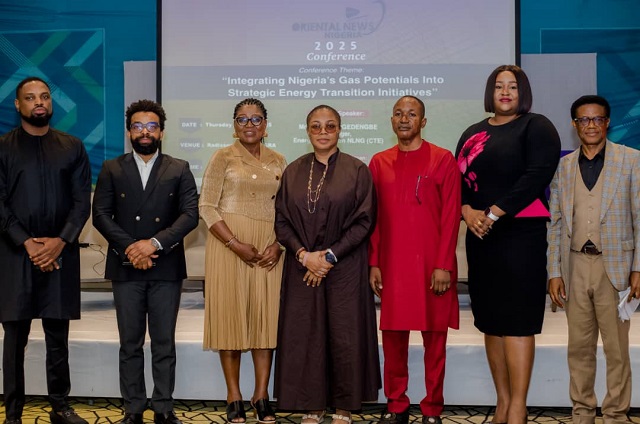Amidst the global shift toward cleaner energy, Nigerian industry leaders have called for a bold, locally-driven approach to leveraging the country’s vast natural gas reserves.
Speaking at the 4th Oriental News Conference held in Lagos on Thursday, July 24, 2025, participants from across the oil, gas, and power sectors stressed that Nigeria must stop imitating foreign energy transition models and begin designing a strategic roadmap that reflects its unique economic and developmental needs.
Themed “Integrating Nigeria’s Gas Potentials into Strategic Energy Transition Initiatives,” the conference brought together high-level experts who urged the federal government and private sector to align on actionable frameworks that would unlock the full value of Nigeria’s over 210 trillion cubic feet of natural gas.
Temitope Ogedengbe, Manager, Energy Transition at NLNG, set the tone, warning that “Nigeria must avoid a ‘copy-paste’ approach to energy transition.” Instead, she said, the country should adopt a homegrown strategy rooted in its socio-economic realities: economic development, energy security, and national growth.
“Our transition must leverage our unique strengths and resources to grow our economy,” Ogedengbe emphasized. “We are still failing and reinjecting gas because there is no commercial arrangement to optimize this.”
She lamented the underutilization of Nigeria’s gas resources, citing continued flaring, reinjection, and lack of viable offtake arrangements.
While marginal fields offer promise, Ogedengbe noted they are economically difficult to produce, a challenge the Nigerian Upstream Petroleum Regulatory Commission’s Gas Flaring Commercialisation Programme is attempting to solve.
Additionally, she warned that despite demand in global markets—particularly in Europe—Nigerian LNG could fall behind if not decarbonized.
“Europe now demands lower-carbon LNG. Nigeria must use operational levers to reduce emissions, attract premium markets, and unlock funding opportunities through incentives like reduced taxes and levies,” she added.
According to Ogedengbe, NLNG is expanding its capacity to 30 million tonnes per annum while incorporating technologies to reduce emissions and generate carbon credits to remain globally competitive.
Also speaking at the conference, former Minister of Power, Professor Bart Nnaji, warned that Nigeria’s power sector cannot grow without reliable gas supply.
“Gas-fired plants will dominate electricity generation in Nigeria for the next two decades,” he stated, adding that the country’s failure to invest adequately in gas infrastructure has hindered generation capacity.
As Chairman of Geometric Power Ltd, Prof. Nnaji underscored the need for synergy between public and private actors:
“The government must act as a true enabler. With over 210 trillion cubic feet of gas, it’s baffling we still face local shortages,” he said. “We’re not producing enough gas to support operations across the country.”
He drew parallels with Nigeria’s past neglect of its coal reserves and emphasized that such patterns of resource underutilization must not be repeated with gas.
Adding a sobering voice to the discussion, Engr. Chichi Emenike, Acting Managing Director and Gas Asset Manager at Neconde Energy Ltd, painted a bleak picture of gas economics in Nigeria, citing policy inconsistencies, non-payment of delivered gas, and dollarised production inputs as key disincentives for investors.
“We’ve supplied gas to GenCos for nearly two years without payment,” Emenike revealed. “Yet we sourced loans to produce these molecules. How do we pay back?”
She explained that gas production in Nigeria is highly dollarised, making it even more expensive than crude oil production due to imported technology, sophisticated drilling processes, and extensive operational costs.
“Every part of gas operations, from O&M to drilling, is imported in US dollars. Gas handling is far more complex and costly than crude,” she said.
Emenike cited a figure of over 500 million standard cubic feet (scf) being transported daily, costing operators massive sums, yet profitability is hindered by absence of commercial viability.
Calling for a pragmatic national energy plan, Emenike urged the government to start with low-hanging fruit and small struggling gas fields, rather than chasing unattainable mega-projects.
“We need to sit down as a nation and ask: What is needed to fix Nigeria’s economy first? A selfish Nigerian plan could transform the Gulf of Guinea if we are serious.”
She called for urgent policy clarity, flexibility in pricing, and infrastructure sharing across the value chain.
“Gas economics must be end-to-end. Before you even draw financing, your investment must be backed by a strong commercial case. But our policies flip-flop. That’s why our IRRs collapse.”
Emenike criticised the regulatory environment, accusing agencies of rent-seeking behaviours that stifle operations and create an unpredictable business climate.
“They hit investors with needless fines for non-conformity—even when the investor has been forced to shut down due to the crisis government created,” she said. “Government has no business in business. Quick fixes won’t work.”
Across the board, conference speakers agreed that Nigeria’s gas sector is at a critical juncture. Without serious regulatory reform, market-based pricing, and infrastructure investment, the country risks squandering its gas potential while the world moves forward.
“We must define our position in the global energy transition clearly,” Emenike concluded. “And we must act with urgency, coordination, and vision—before investors take their capital elsewhere.”

